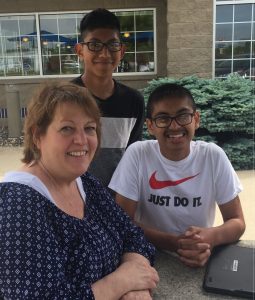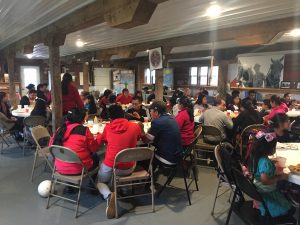News > Immigration In Minnesota
Catching Dreams and Building Family Ties
Posted on Apr 06 2020

A Worthington area native, Lisa Kremer has been a strong force in drawing these families into the local community. Together with local immigrants, she co-founded the organization Familias Juntas, a group that advocates for immigrants in need.
That organization’s “Dream Catchers” program helps prepare immigrants’ children for community leadership. “They’re so much fun,” Lisa says. “We build up the kids, promoting skills and gifts. We talk to them about how much they have to offer and find ways that all the kids get acknowledged for who they are and what they can contribute.”
Most of these children were born in the Worthington area, so they are U.S. citizens, while their parents — who might have crossed the U.S. border years or decades ago — are still waiting to learn whether they will be allowed to stay. The immigration process is slow and uncertain. For immigrant families, this creates a barrage of problems that Lisa, her immigrant neighbors, and others in the Worthington area began addressing in 2012.
Some parents must make the 3-hour trip to Minneapolis at regular intervals for immigration hearings. People without cars or driving licenses must sometimes pay as much as $500 for the ride. Parents and children know that at one of these check-ins the parent could be ordered deported and might not return home that night.
And there are other things to worry about. At any time, ICE officers might have reason to raid a workplace with immigrant employees or to knock on a family’s door with questions. A parent who answers or whose immigration papers are not in perfect order might be taken from the home, held in jail, and set on a long road to deportation. A simple traffic stop can place an immigrant in the same situation, leaving the family to cope with the loss of a parent and an explosion of expenses.
To deal with one aspect of family separation, Familias Juntas (Families Together) was founded in 2012 and launched its Abuelos y Nietos program (Grandparents and Grandchildren). This program arranged for immigrants’ children born in the U.S. to better understand their bi-cultural identity by visiting their grandparents and other relatives in Guatemala.
With assistance from the Guatemalan government, Catholic Church leaders, and many volunteers and donors, Lisa organized trips in 2013 and 2014 for groups of children to meet their close relatives in Central America. Film-maker Luis Argueta followed the groups and made the documentary Abrazos (Embraces) showing what the experience meant to the children and their Guatemalan families.
Political changes in Guatemala soon made subsequent trips impossible, so Lisa and her colleagues followed Monsignor Gregory Schaffer’s teachings about “servant-leadership” and started a conversation in the Worthington area about “what the people need now.” Servant-leadership involves working as an equal with those one serves and responding to their “expressed felt needs.”

Following those conversations, Familias Juntas continued its commitment to “protecting the families caught in our broken immigration system.” The group organized volunteers to provide low-cost rides for individuals who must attend an ICE check-in or court appointment in Minneapolis. Other volunteers visit people jailed in ICE custody to help them understand the legal process and to help their families arrange phone calls and visits.
Another ongoing result of these discussions with local immigrants is a group called the Worthington Area Immigrant Advocates, a consortium of individuals, churches, schools, human service agencies, labor unions, and legal teams whose particular missions come together over immigration issues.
Lisa says the possibility of ICE raids like the packing-house raid in 2006 has increased in recent years, so the Advocates planned several local “Know Your Rights” presentations and developed an “Emergency Family Plan” for parents “to protect themselves and their children as much as possible if the family is separated.”
In the event of a raid, the group is currently forming rapid response teams who would go to the scene to record how a raid is conducted and how individuals are treated. The teams would also arrange care for children whose parents are detained after the raid and provide referrals for those needing legal help.
Another venture within Familias Juntas is the “Dream Catchers” project, a faith-based summer youth leadership program founded in 2016 with a grant from the national organization “First Focus.” Each summer Tuesday, 36 immigrant children aged 9-15 travel by bus to a farm near Worthington to maintain vegetable gardens for their families under the direction of a Master Gardener. In addition to gardening, much of the day is taken up with lessons from community leaders on servant-leadership, justice, activism, advocacy, immigration issues, communication skills, public speaking, and scripture.
The group’s name was selected at one of the first sessions when, Lisa reports, “we discussed the importance of naming and they were encouraged to come up with a name for the youth program. Upon the suggestion of one young man, they chose the name ‘Dream Catchers.’ This young man explained that, like a Dream Catcher in the Native American tradition, they want to stop the ‘bad dreams’ from happening to their families and only let the ‘good dreams’ pass through.”
On summer Tuesdays, the Dream Catchers play games, do craft projects and talk with local political or religious figures, attorneys, and other community leaders. These sessions help the young people learn how the community works while encouraging them to explore their own capacity to become leaders. As part of the program, some Dream Catchers volunteer to make presentations at community events about what they have learned. “That’s one way to get a positive thing out there about immigration,” Lisa says. “People realize, wow, these kids are really intelligent and trying to be good leaders and trying to do good for the community.”
Lisa emphasizes that Familias Juntas and the Worthington Area Immigrant Advocates are part of an area-wide effort to address humanitarian needs of families caught in a broken immigration system. The programs are locally developed ways of looking out for the well-being of immigrant neighbors who contribute much to the community and form a big part of the local labor force. Lisa has recently stepped into a position in Parish Social Ministry with Catholic Charities of Southern Minnesota, where she will address a range of social issues while continuing her work with immigrant families. She can be reached at LKremer@CCsomn.org.




